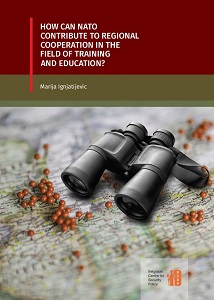

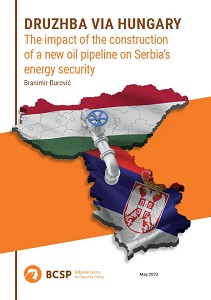
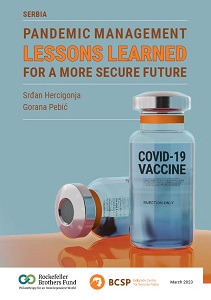
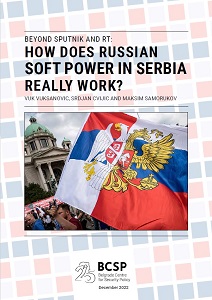
Based on the research findings, it can be concluded that soft power is a major elementof the Russian presence in Serbia. However, the catch is that Russia’s soft power inSerbia is not operating based on the traditional definition of the term, derived from theattractiveness of a political and social model, but rather on the fact that the majority ofthe public in Serbia sees Russia as an alternative to the West, by which it feels betrayed,abandoned and never fully accepted. This has resulted in the enormous popularity ofRussia, which is now a major impediment for Serbia joining the EU sanctions againstMoscow or any overt anti-Russian policies.
More...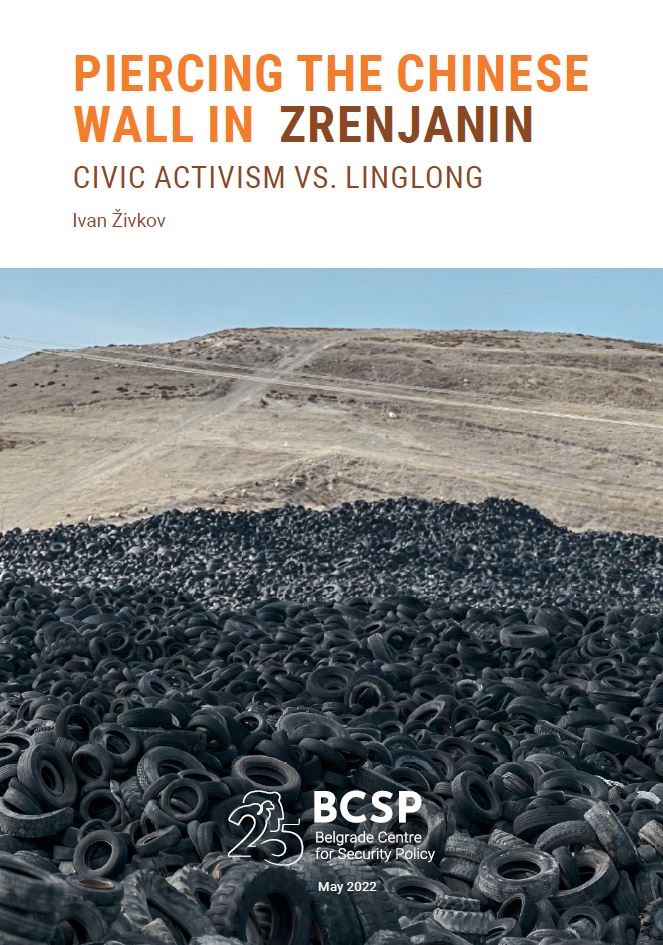
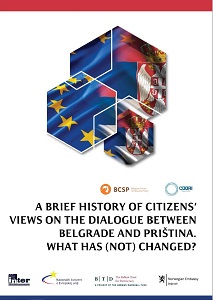
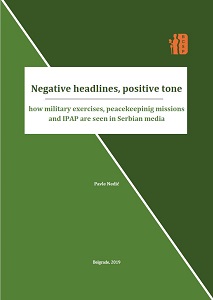
In Serbian media peacekeeping missions and military exercises are mainly referred to in the context of Kosovo. Multinational operations are overwhelmingly brought up in positive context. Individual Partnership Action Plan (IPAP) is mostly touched upon in positive tone, but the reports are generally very polarized and the number of neutral texts is rather small. Overall, military exercises are the most frequently mentioned topic. However, in the reports on military exercises, Russia is never referred to in a negative tone. On the other hand, NATO is primarily mentioned in a neutral or a negative tone. This analysis focuses on media reporting regarding selected keywords, namely military exercises, peacekeeping missions, multinational operations and IPAP. These keywords were selected because they receive considerable attention in the media, but there is often a mix of true and false information in reports on them. The analysis covered 383 media pieces published between 1 December 2018 and 28 February 2019. Media sources included online portals, printed newspapers, TV and radio. The goal was to determine how often and in what context these subjects are mentioned in the media, which media sources report on them the most and whether they are brought up in positive, neutral or negative tone. We also measured how often key international actors, namely NATO, Russia and the EU are referred to. Furthermore, the tone towards NATO and Russia was analyzed in media pieces regarding military exercises and IPAP respectively.
More...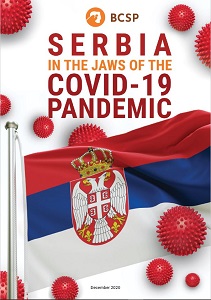
The public opinion poll conducted by the Belgrade Centre for Security Policy (BCSP) in October 2020 shows that the society is divided, both when it comes to measures taken in relation to the COVID-19 pandemic and regarding the reaction of the competent institutions to the health crisis. Although no less than a third of the Serbian citizens do not believe in or have serious doubts about the existence of the COVID-19 pandemic,1the vast majority of them are of the opinion that the health crisis will have serious economic consequences, while a third are convinced that it has affected the level of democracy in Serbia. Most people see the pandemic as a threat to human and national security, but they are divided over how this crisis has affected their everyday lives. Polarisation was identified in relation to the level of trust in state institutions. Citizens trust the health care system the most, which is not surprising since the health care system commonly occupies a very high position in general surveys conducted to measure trust in all institutions. The reason for the high level of trust in the health system is the fact that it is the entire health system – not just the specialised COVID departments – that is bearing the brunt of the pandemic. As for other institutions, the percentage of trust in the President of the Republic and the Crisis Task Force for the Protection of the Population from the Infectious Disease COVID-19 stands at almost fifty-fifty, which again reflects the broader picture of citizens’ (dis)trust in these permanent and temporary institutions. One of the reasons for the division in the perception of disease as a threat to the personal safety of citizens is poor informing and reporting on the course and consequences of the pandemic (frequent contradictory messages provided by the Crisis Task Force and the authorities), which has been identified in the survey as one of the biggest problems of pandemic management. An enormous number of citizens perceive China as the largest financial and humanitarian donor during the period of the pandemic, which also influences - in the general survey - positive opinions about foreign countries, where China ranks first. Despite the fact that it was in fact the European Union that helped Serbia the most in the fight against the Coronavirus, in both financial and humanitarian terms, in the eyes of the citizens China still convincingly holds the first place.
More...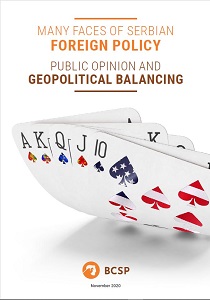
The findings of the public opinion survey conducted by CeSID for the needs of theBelgrade Centre for Security Policy (BCSP) in the period from September 15 to October5, 2020, on a representative sample of 1,200 citizens of Serbia.
More...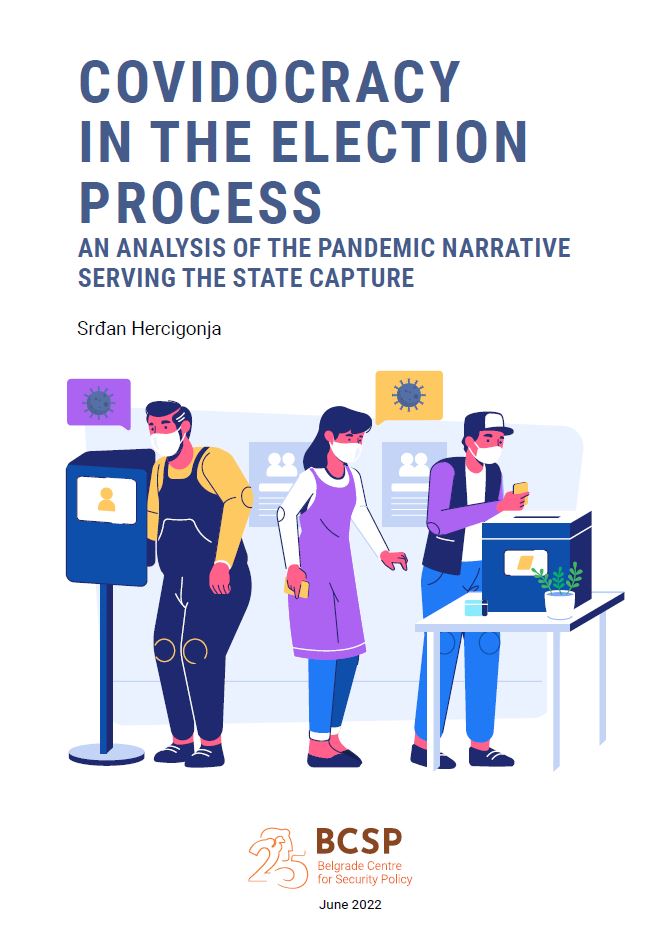

Keywords: Gender analysis; gender studies; security sector
Gender analysis investigates the relationships and differences between men and women in their respective roles, status, position in the society, and privileges. If we understand gender differences, this will enable us to understand the effects that existing or planned policies, programmes, and ways in which services are provided, have on different gender groups, as well as to improve the position of a gender group in less favourable position. Conducting the gender analysis is absolutely necessary in the processes of creating and implementing the strategies and policies since it enables us to take account of their different implications for different gender groups. In this text we will present the development of interest for gender mainstreaming and gender analysis, concrete steps in the implementation of this analysis, and the most significant theoretical-methodological approaches to gender analysis. Possibilities for the application of gender analysis in security sector – when creating and reforming the policies, formulating and revising the legislation, planning the services, and planning and implementing the projects, are presented here below in more detail and appertaining examples are provided.
More...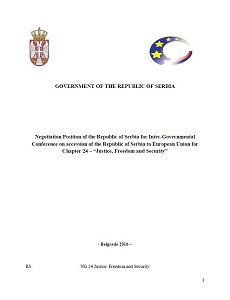
Keywords: European Union; EU accession; Serbia; international relations
Republic of Serbia accepts the EU acquis with respect to Chapter 23 Judiciary and Fundamental Rights as it stands on 1 January 2016 and will be in the position to implement it fully by the time it accesses to EU membership. Republic of Serbia will have implemented any outstanding acquis, by the date of accession, subject to the outcome of the negotiations under this chapter. Republic of Serbia stands aware of the financial burden arising from the commitments in this Chapter and is willing to undertake these obligations. Republic of Serbia does not request specific adaptations under this chapter.
More...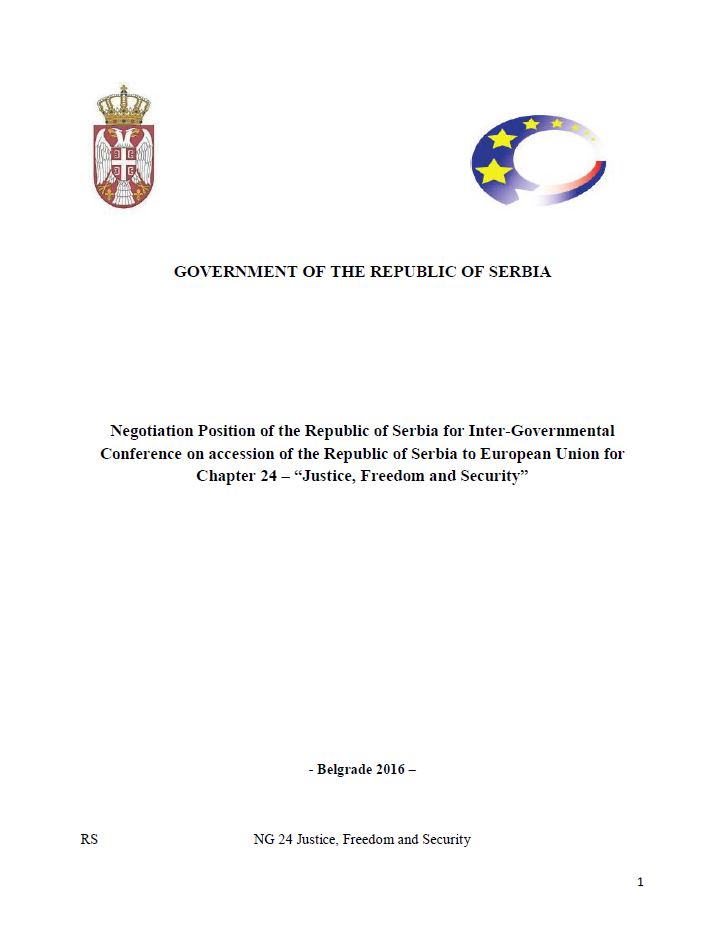
Keywords: European Union; Serbia; EU accession; international relations
The Republic of Serbia accepts the EU acquis with respect to Chapter 24 Justice, Freedom and Security as it stands on 01. January 2016. and will be in the position to implement it fully by the time it acceeds to the European Union. The Republic of Serbia will have transposed any outstanding acquis, by the date of accession, subject to the outcome of the negotiations under this chapter. The Republic of Serbia does not request derogations or transitional measures under this chapter. The Republic of Serbia does not expect to enter the Schengen area or gain access to the Schengen Information System (SISII) on the date of accession to the European Union.The preparations for joining the Schengen area will start through the adoption and implementation of the National Schengen Action Plan. Serbia recognizes that the EU is strongly committed to the principle of neutrality on the Kosovo*1 status, both in bilateral contacts and in the dialogue on normalization of relations between Belgrade and Pristina. Having that said, Serbia recognizes that Screening Report has several Recommendations in the area of migrations, external borders and Schengen, Judicial cooperation in civil, commercial and criminal matters, Police cooperation and the fight against organized crime relating to continued normalization of relations with Kosovo* and recognise that those issues are elements of the EU acquis in Chapter 24. Serbia will remain fully committed to the continued normalization of relations with Kosovo* and implementation of all agreements reached in the dialogue, in particular the IBM agreement, including by cooperating with EULEX as appropriate.
More...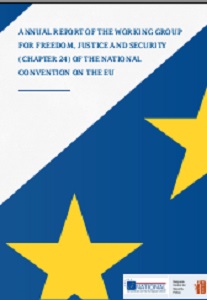
Keywords: European Union; Serbia; security; international relations
Within the corpus of the European Union community law (acquis communautaire), negotiation Chapter 24 covers policies in the field of justice, freedom and security. More specifically, this chapter covers policies that mostly fall within the scope of a country’s internal affairs and on which the security of citizens and their access to justice largely depend. Chapter 24 includes a set of regulations that represent the best European practices and standards in areas such as protection of external borders, police cooperation among the Member States, the regulation of migration, judicial cooperation, the fight against terrorism, and other areas essential for the safety of citizens.
More...
Keywords: security sector; gender studies; gender equality; Serbia; gender advisor
Mechanisms for introducing a gender equality policy into security sector governance, aimed at bringing about gender-sensitive treatment of women beneficiaries of the security system, are still lacking in Serbia. One way to ensure that gender equality issues are continuously addressed is to create a specific position for an individual whose job would be to advise top management about measures for improving gender equality. The National Action Plan (NAP) for the implementation of UN Security Council Resolution 1325 in Serbia envisages the introduction of a gender advisor to the minister/director at the Ministry of Defence, the Ministry of Interior, the Customs Administration, the Security-Information Agency, and the Administration for Enforcement of Penal Sanctions. The advisor’s task would be to advise managers during the process of developing and implementing policies, with the goal of facilitating respect for the rights of women and men, both those employed in the security sector and those who use the services provided by security sector institutions. The same document envisages the inclusion of gender advisors in the composition of Serbian contingents in multinational operations. The intention of this text is to provide a position description, a method for selecting the gender advisor, and the ideal profile of a gender advisor. Conclusions and recommendations are made, based on the experience of other countries and on guidelines provided by participants in a specific round table on gender advisors, organised by the BCSP with the support of DCAF, and in workshops on gender advisors, organised by the BFPE in cooperation with BCSP with the financial support of the OSCE Mission in Serbia, within the framework of the training programme “Introduction of a Gender Perspective into Security Sector Reform”.
More...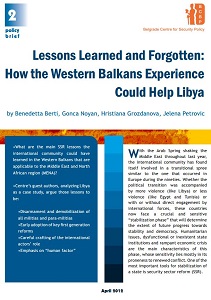
Keywords: Western Balkans; Libya; international relations; Middle East and North African region (MENA); security sector
With the Arab Spring shaking the Middle East throughout last year, the international community has found itself involved in a transitional spree similar to the one that occurred in Europe during the nineties. Whether the political transition was accompanied by more violence (like Libya) or less violence (like Egypt and Tunisia) or with or without direct engagement by international forces, these countries now face a crucial and sensitive “stabilization phase” that will determine the extent of future progress towards stability and democracy. Humanitarian issues, dysfunctional or inexistent state institutions and rampant economic crisis are the main characteristics of this phase, whose sensitivity lies mostly in its proneness to renewed conflict. One of the most important tools for stabilization of a state is security sector reform (SSR).
More...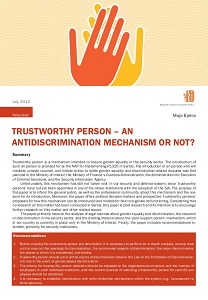
Keywords: Trustworthy person; gender equality; security sector; gender equality in the security sector
Trustworthy person is a mechanism intended to ensure gender equality in the security sector. The introduction of such an person is provided for by the NAP for Implementing R1325 in Serbia. The introduction of an person who will mediate, provide counsel, and initiate action to settle gender equality and discrimination-related disputes was first planned in the Ministry of Interior, the Ministry of Finance’s Customs Administration, the Administration for Execution of Criminal Sanctions, and the Security Information Agency. Unfortunately, this mechanism has still not ‘taken root’ in our security and defence system, since ‘trustworthy persons’ have not yet been appointed in any of the above institutions with the exception of the SIA. The purpose of this paper is to inform the general public, as well as the professional community, about this mechanism and the reasons for its introduction. Moreover, the paper offers political decision-makers and prospective ‘trustworthy persons’ proposals for how this mechanism can be introduced and models for how to organise its functioning. Considering that no research on this matter has been conducted in Serbia, this paper is pilot research and its intention is to encourage further research on this matter and other related issues. The paper primarily rests on the analysis of legal sources about gender equality and discrimination, the research on discrimination in the security sector, and the existing material about the ‘peer support person’ mechanism, which in our country is currently in place only in the Ministry of Interior. Finally, the paper includes recommendations intended, primarily, for security institutions.
More...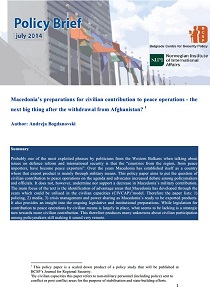
Keywords: North Macedonia; civilian peace operations; Afghanistan
Probably one of the most exploited phrases by politicians from the Western Balkans when talking about issues on defence reform and international security is that the “countries from the region, from peace importers, have become peace exporters”. Over the years Macedonia has established itself as a country where that export product is mainly through military means. This policy paper aims to put the question of civilian contribution to peace operations on the agenda and advocates increased debate among policymakers and officials. It does not, however, undermine nor support a decrease in Macedonia’s military contribution. The main focus of the text is the identification of advantage areas that Macedonia has developed through the years which could be utilised in the civilian capacities (CIVCAP) 2 model. Therefore the paper lists: 1) policing, 2) media, 3) crisis management and power sharing as Macedonia’s ready to be exported products. It also provides an insight into the ongoing legislative and institutional preparations. While legislation for contribution to peace operations by civilian means is largely in place, what seems to be lacking is a strategic turn towards more civilian contribution. This therefore produces many unknowns about civilian participation among policymakers still making it sound very remote
More...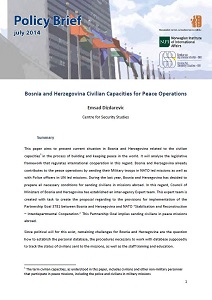
Keywords: Bosnia and Herzegovina; Civilian Capacities; civilian Peace Operations
This paper aims to present current situation in Bosnia and Herzegovina related to the civilian capacities1 in the process of building and keeping peace in the world. It will analyse the legislative framework that regulates international cooperation in this regard. Bosnia and Herzegovina already contributes to the peace operations by sending their Military troops in NATO led missions as well as with Police officers in UN led missions. During the last year, Bosnia and Herzegovina has decided to prepare all necessary conditions for sending civilians in missions abroad. In this regard, Council of Ministers of Bosnia and Herzegovina has established an inter-agency Expert team. This expert team is created with task to create the proposal regarding to the provisions for implementation of the Partnership Goal 3781 between Bosnia and Herzegovina and NATO “Stabilisation and Reconstruction – Interdepartmental Cooperation.” This Partnership Goal implies sending civilians in peace missions abroad. Since political will for this exist, remaining challenges for Bosnia and Herzegovina are the question how to establish the personal database, the procedures necessary to work with database supposedly to track the status of civilians sent to the missions, as well as the staff training and education.
More...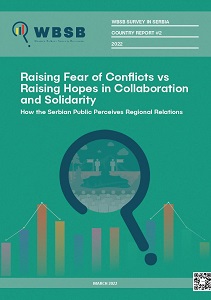
Keywords: peace and conflict; Serbia; regional relations; international relations; solidarity; Western Balkans
In recent months, citizens in the Balkans have been talking intensely about whether there will be a new conflict in Bosnia and Herzegovina or between Serbs and Albanians in Kosovo. While democratisation and Euro-Atlantic integration were one of the main drivers of reducing tensions after the Yugoslav wars, the current context in the Western Balkans is characterised by democratic regression, and even the restoration of autocracy as ideologies of the 1990s resurface, accompanied by the negligence of the entire region on the part of the EU. The COVID-19 pandemic has only accelerated the overall trend of democratic erosion and exposed populist leaders willing to use every crisis to grab even more power and further undermine democratic norms and institutions, while exploiting long-standing ethnic divisions. In such an environment, there is little room for genuine cooperation among the Western Balkan countries. In recent years, Serbia has worked intensively to improve relations with global and regional powers, and to turn old enemies into new friends, such as the United States, Turkey or Hungary, while Serbia’s relations with most Western Balkan countries could be described as “one step forward, two steps back”. Much of the incentives for regional cooperation and the improvement of bilateral relations between the Western Balkans countries has been driven by the EU or its members states. However, as the entire region became increasingly isolated due to the disappearance of the EU accession prospect in the near future, some Western Balkan countries have decided to launch their own initiatives. To shed the light on the Serbian public views on regional dynamics, potential for conflicts in the region, but also regional cooperation and solidarity, the Belgrade Centre for Security Policy (BCSP) conducted a public opinion survey from mid to late September 2021, on a sample of 1,000 Serbian citizens. The results of the survey are presented in the following paragraphs.
More...